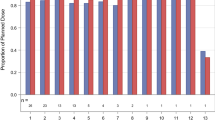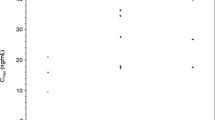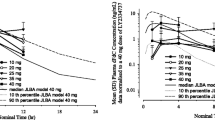Abstract
Purpose
AZD7762, a potent Chk1/Chk2 inhibitor, has shown chemosensitizing activity with gemcitabine in xenograft models.
Methods
This open-label, Phase I, dose-escalation study evaluated the safety, pharmacokinetics (PK) and preliminary efficacy (RECIST) of AZD7762 alone and in combination with gemcitabine in Japanese patients with advanced solid tumours (NCT00937664). Patients received intravenous AZD7762 alone on days 1 and 8 of a 14-day cycle (cycle 0), followed by AZD7762 plus gemcitabine 1,000 mg/m2 on days 1 and 8 of 22-day cycles, in ascending AZD7762 dose cohorts.
Results
Twenty patients received AZD7762 at doses of 6 mg (n = 3), 9 mg (n = 3), 21 mg (n = 6) and 30 mg (n = 8). Dose-limiting toxicities occurred in 2/6 evaluable patients in the 30-mg cohort: one, CTCAE grade 3 elevated troponin T (cycle 0: AZD7762 monotherapy); one, neutropenia, thrombocytopenia, and elevated aspartate aminotransferase and alanine aminotransferase (cycle 1: combination therapy). The 30 mg dose was therefore regarded as non-tolerable. The most common adverse events (AEs) in cycle 0 (AZD7762 monotherapy) were bradycardia (50 %), hypertension (25 %) and fatigue (15 %). Overall, the most common AEs were bradycardia (55 %), neutropenia (45 %) and hypertension, fatigue and rash (30 % each). Grade ≥3 AEs were reported in 11 patients, the most common being neutropenia (45 %) and leukopenia (25 %). AZD7762 exposure increased approximately linearly. Gemcitabine did not appear to affect AZD7762 PK. There were no objective responses; five patients (all lung cancer) had stable disease.
Conclusions
The maximum tolerated dose of AZD7762 in combination with gemcitabine, 1,000 mg/m2 was determined as 21 mg in Japanese patients.


Similar content being viewed by others
References
Bucher N, Britten CD (2008) G2 checkpoint abrogation and checkpoint kinase-1 targeting in the treatment of cancer. Br J Cancer 98:523–528
Ashwell S, Zabludoff S (2008) DNA damage detection and repair pathways—recent advances with inhibitors of checkpoint kinases in cancer therapy. Clin Cancer Res 14:4032–4037
Dai Y, Grant S (2010) New insights into checkpoint kinase 1 in the DNA damage response signaling network. Clin Cancer Res 16:376–383
Mitchell JB, Choudhuri R, Fabre K, Sowers AL, Citrin D, Zabludoff Z, Cook JA (2010) In vitro and in vivo radiation sensitization of human tumor cells by a novel checkpoint kinase inhibitor, AZD7762. Clin Cancer Res 16:2076–2084
Chen Z, Xiao Z, Chen J, Ng SC, Sowin T, Sham H, Rosenberg S, Fesik S, Zhang H (2003) Human Chk1 expression is dispensable for somatic cell death and critical for sustaining G2 DNA damage checkpoint. Mol Cancer Ther 2:543–548
Janetka JW, Ashwell S, Zabludoff S, Lyne P (2007) Inhibitors of checkpoint kinases: from discovery to the clinic. Curr Opin Drug Discov Devel 10:473–486
Morgan MA, Parsels LA, Maybaum J, Lawrence TS (2008) Improving gemcitabine-mediated radiosensitization using molecularly targeted therapy: a review. Clin Cancer Res 14:6744–6750
Zabludoff SD, Deng C, Grondine MR, Sheehy AM, Ashwell S, Caleb BL, Green S, Haye HR, Horn CL, Janetka JW, Liu D, Mouchet E, Ready S, Rosenthal JL, Queva C, Schwartz GK, Taylor KJ, Tse AN, Walker GE, White AM (2008) AZD7762, a novel checkpoint kinase inhibitor, drives checkpoint abrogation and potentiates DNA-targeted therapies. Mol Cancer Ther 7:2955–2966
Ho AL, Bendell JC, Cleary JM, Schwartz GK, Burris HA, Oakes P, Agbo F, Barker PN, Senderowicz AM, Shapiro G (2011) Phase I, open-label, dose-escalation study of AZD7762 in combination with irinotecan (irino) in patients (pts) with advanced solid tumors. J Clin Oncol 29(15S):abst 3033
Sausville EA, LoRusso P, Carducci MA, Barker PN, Agbo F, Oakes P, Senderowicz AM (2011) Phase I dose-escalation study of AZD7762 in combination with gemcitabine (gem) in patients (pts) with advanced solid tumors. J Clin Oncol 29(15S):abst 3058
AstraZeneca (2011) Global policy: bioethics. Available at: http://www.astrazeneca.com/Responsibility/Code-policies-standards/Our-global-policies
Therasse P, Arbuck SG, Eisenhauer EA, Wanders J, Kaplan RS, Rubinstein L, Verweij J, Van Glabbeke M, van Oosterom AT, Christian MC, Gwyther SG (2000) New guidelines to evaluate the response to treatment in solid tumors. European Organization for Research and Treatment of Cancer, National Cancer Institute of the United States, National Cancer Institute of Canada. J Natl Cancer Inst 92:205–216
Takai H, Tominaga K, Motoyama N, Minamishima YA, Nagahama H, Tsukiyama T, Ikeda K, Nakayama K, Nakanishi M, Nakayama K (2000) Aberrant cell cycle checkpoint function and early embryonic death in Chk1(−/−) mice. Genes Dev 14:1439–1447
Erickson JR, He BJ, Grumbach IM, Anderson ME (2011) CaMKII in the cardiovascular system: sensing redox states. Physiol Rev 91:889–915
Doganli C, Kjaer-Sorensen K, Knoeckel C, Beck HC, Nyengaard JR, Honore B, Nissen P, Ribera A, Oxvig C, Lykke-Hartmann K (2012) The alpha2Na+/K+-ATPase is critical for skeletal and heart muscle function in zebrafish. J Cell Sci. doi:10.1242/jcs.115808 [Epub ahead of print]
Aapro MS, Martin C, Hatty S (1998) Gemcitabine—a safety review. Anticancer Drugs 9:191–201
Akaza H, Tsukamoto T, Murai M, Nakajima K, Naito S (2007) Phase II study to investigate the efficacy, safety, and pharmacokinetics of sorafenib in Japanese patients with advanced renal cell carcinoma. Jpn J Clin Oncol 37:755–762
Takao S, Tokuda Y, Saeki T, Funai J, Ishii M, Takashima S (2012) Long-term gemcitabine administration in heavily pretreated Japanese patients with metastatic breast cancer: additional safety analysis of a phase II study. Breast Cancer 19:335–342
Ueno H, Kosuge T, Matsuyama Y, Yamamoto J, Nakao A, Egawa S, Doi R, Monden M, Hatori T, Tanaka M, Shimada M, Kanemitsu K (2009) A randomised phase III trial comparing gemcitabine with surgery-only in patients with resected pancreatic cancer: Japanese Study Group of Adjuvant Therapy for Pancreatic Cancer. Br J Cancer 101:908–915
Acknowledgments
We would like to thank Zoё van Helmond PhD from Mudskipper Bioscience who provided medical writing assistance funded by AstraZeneca.
Conflict of interest
T.S., T.E., F.H., S.A., K.N., A.M., T.K., C.F., M.H. and H.T. have no conflicts of interest to declare; X.S. and F.A. are employees of AstraZeneca and F.A. also owns stock.
Author information
Authors and Affiliations
Corresponding author
Rights and permissions
About this article
Cite this article
Seto, T., Esaki, T., Hirai, F. et al. Phase I, dose-escalation study of AZD7762 alone and in combination with gemcitabine in Japanese patients with advanced solid tumours. Cancer Chemother Pharmacol 72, 619–627 (2013). https://doi.org/10.1007/s00280-013-2234-6
Received:
Accepted:
Published:
Issue Date:
DOI: https://doi.org/10.1007/s00280-013-2234-6




